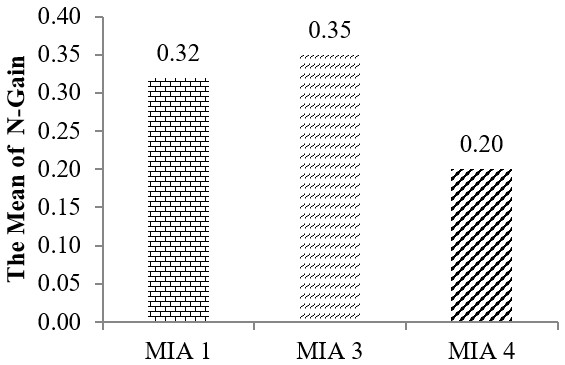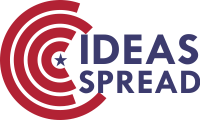The Effectiveness of Ongoing Assessment on Physics Learning in Improving Students Critical Thinking Skills
Abstract
This research was conducted to determine the effectiveness of the ongoing assessment of student learning outcomes. There were three groups of students in this study who used different types of questions. The type of questions used are multiple choices, essays, and true/false. Effectiveness is obtained from the average N-gain score. The results of the product effectiveness test show different results for each type of question. The effectiveness of the ongoing assessment with the type of multiple choice questions and true/false based on the results of the average n-gain included in the category is quite effective. The effectiveness of the ongoing assessment with the type of essay question based on the average n-gain results is included in the less effective category.
References
Abosalem, Y. (2016). Assessment Techniques and Students’ Higher-Order Thinking Skills. International Journal of Secondary Education, 4(1), 1-11. https://doi.org/10.11648/j.ijsedu.20160401.11
Barnett, J. E., & Francis, A. L. (2012). Using higher order thinking questions to foster critical thinking: A classroom study. Educational Psychology, 32(2), 201-211. https://doi.org/10.1080/01443410.2011.638619
Chin, C. (2006). Classroom interaction in science: teacher questioning and feedback to students’ responses. Internationa Journal of Science Education, 28(11), 1315-1346. https://doi.org/10.1080/09500690600621100
Creswell, J. W. (2012). Educational Research: Planning, Conducting, and Evaluating quantitative and qualitative research. Boston: Pearson Education.
Dellos, R. (2015). Kahoot! A digital game resource for learning. International Journal of Instructional Technology and Distance Learning, 12(4), 49-52.
Espasa, A., & Meneses, J. (2010). Analysing feedback processes in an online teaching and learning environment: an exploratory study. HigherEducation, 59(3), 277-292. https://doi.org/10.1007/s10734-009-9247-4
Geveke, C., Steenbeek, H., Doornenbal, J., & van Geert, P. (2016). Improving Pupils’ Conceptual Understanding by a Connected In-school and Out-of-school Science Program: A Multiple Case Study. American Journal of Educational Research, 4(1), 115-125. https://doi.org/10.12691/education-4-1-18
Hake, R. R. (1998). Interactive-engagement versus traditional methods: A six-thousand-student survey of mechanics test data for introductory physics courses. American Journal of Physics, 66(1), 64-74. https://doi.org/10.1119/1.18809
Heitink, M. C., Van der Kleij, F. M., Veldkamp, B. P., Schildkamp, K., & Kippers, W. B. (2016). A systematic review of prerequisites for implementing assessment for learning in classroom practice. Educational Research Review, 17, 50-62. https://doi.org/10.1016/j.edurev.2015.12.002
Karakiozis, K., & Papakitsos, E. C. (2018). Attitudes of Teachers Who Implement School Mediation Programmes:A Case Study. International Educational Research, 1(2), 16-25. https://doi.org/10.30560/ier.v1n2p16
Kearney, S. (2013). Improving engagement: the use of ‘Authentic self-and peer-assessment for learning’ to enhance the student learning experience. Assessment & Evaluation in Higher Education, 38(7), 875-891. https://doi.org/10.1080/02602938.2012.751963
Kiryak, Z., & Çalik, M. (2018). Improving grade 7 students’ conceptual understanding of water pollution via common knowledge construction model. International Journal of Science and Mathematics Education, 16(6), 1025-1046. https://doi.org/10.1007/s10763-017-9820-8
Krause, U. M., Stark, R., & Mandl, H. (2009). The effects of cooperative learning and feedback on e-learning in statistics. Learning and instruction, 19(2), 158-170. https://doi.org/10.1016/j.learninstruc.2008.03.003
Leirhaug, P. E., & MacPhail, A. (2015). ‘It's the other assessment that is the key’: three Norwegian physical education teachers' engagement (or not) with assessment for learning. Sport, Education and Society, 20(5), 624-640. https://doi.org/10.1080/13573322.2014.975113
Loes, C. N., Salisbury, M. H., & Pascarella, E. T. (2015). Student perceptions of effective instruction and the development of critical thinking: A replication and extension. Higher Education, 69(5), 823-838. https://doi.org/10.1007/s10734-014-9807-0
Nurulsari, N., Abdurrahman, A., & Suyatna, A. (2017). Development of soft scaffolding strategy to improve student’s creative thinking ability in physics. Journal of Physics: Conference Series, 909(1), 1-8. https://doi.org/10.1088/1742-6596/909/1/012053
Pokorny, H., & Pickford, P. (2010). Complexity, cues, and relationships: Student perceptions of feedback. Active Learning in Higher Education, 11(1), 21-30. https://doi.org/10.1177/1469787409355872
Pradana, F. A., & Suyatna, A. (2017). The Needs of Interactive Electronic School Books to Enhance the Critical Thinking Skills of the Students. Advances in Social Science, Education and Humanities Research (ASSEHR), (158), 263-271. https://doi.org/10.2991/ictte-17.2017.50
Romli, S., Abdurrahman, A., & Riyadi, B. (2018). Designing students' worksheet based on open-ended approach to foster students' creative thinking skills. Journal of Physics: Conference Series, 948-1. https://doi.org/10.1088/1742-6596/948/1/012050
Salihu, L., Aro, M., & Räsänen, P. (2017). Dynamic potential of feedback in self-regulated learning and motivation of children with mathematical learning difficulties. Hrvatska revija za rehabilitacijska istraživanja, 53(2), 111-129. https://doi.org/10.31299/hrri.53.2.9
Schunk, D. H. (2005). Self-Regulated Learning: The Educational Legacy of Paul R Pintrich. Educational Psycologist, 40(2), 85-94. https://doi.org/10.1207/s15326985ep4002_3
Stiggnis, R. J. (1994). Student-Centered Classroom Assessment. New York. Macmillan College Publishing Company.
Thomas, G., Martin, D., & Pleasants, K. (2011). Using self and peer-assessment to enhance students’ future learning in higher education. Journal of University Teaching & Learning Practice, 8(1), 5.
Van Blankenstein, F. M., Dolmans, D. H., Van der Vleuten, C. P., & Schmidt, H. G. (2013). Relevant prior knowledge moderates the effect of elaboration during small group discussion on academic achievement. Instructional Science, 41(4), 729-744. https://doi.org/10.1007/s11251-012-9252-3
Wylie, C., & Neeley, K. (2016). Learning Out Loud (LOL): How Comics Can Develop the Communication and Critical Thinking Abilities of Engineering Students. In Proceedings of the 2016 ASEE Annual Conference. https://doi.org/10.18260/p.25542


This work is licensed under a Creative Commons Attribution 4.0 International License.
Copyright for this article is retained by the author(s), with first publication rights granted to the journal.
This is an open-access article distributed under the terms and conditions of the Creative Commons Attribution license (http://creativecommons.org/licenses/by/4.0/).








1.png)

















